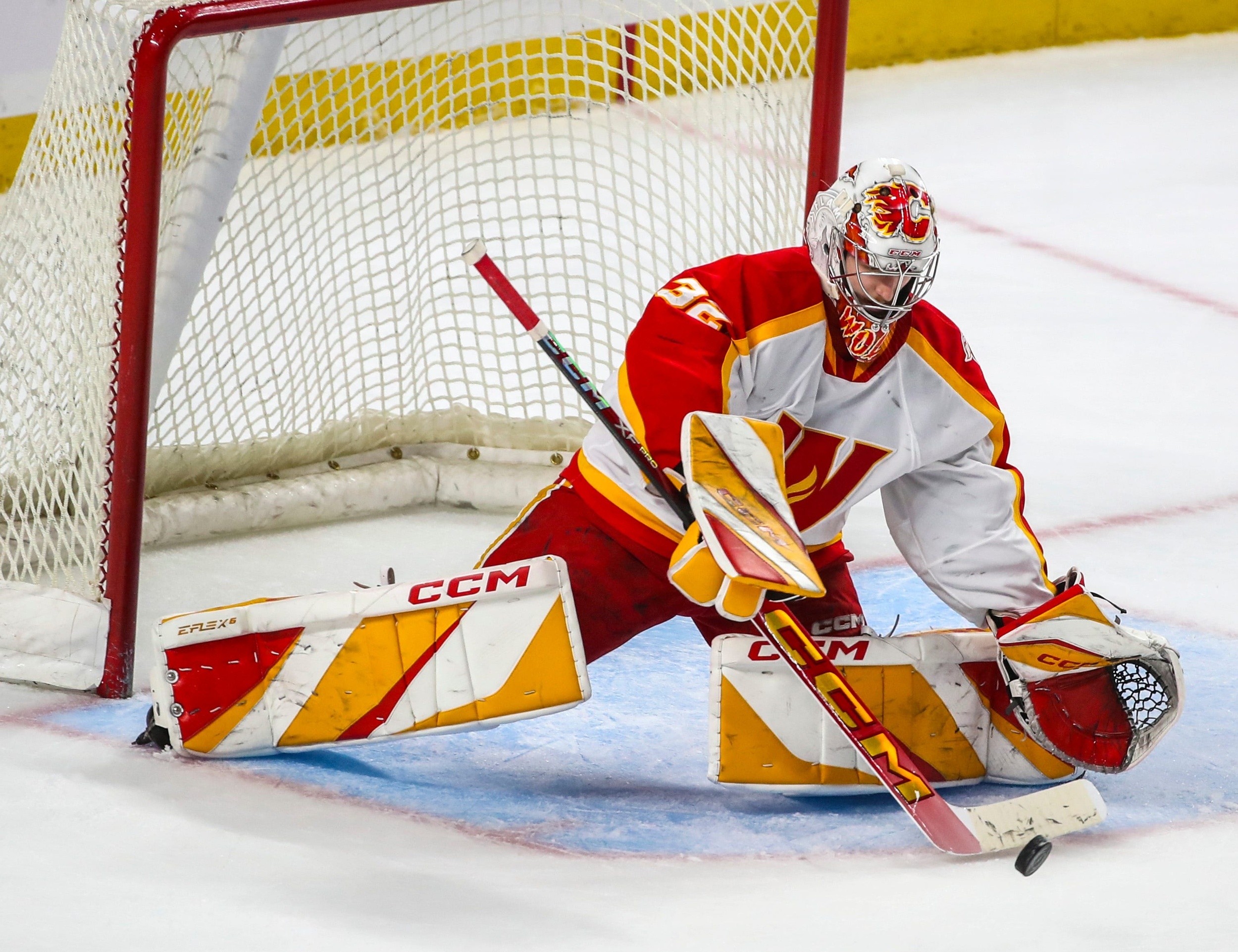
WHAT SHOULD DUSTIN WOLF’S NEXT CONTRACT WITH THE CALGARY FLAMES LOOK LIKE?
After three seasons of pro hockey, there are a few things we think we know about Dustin Wolf.
He was the American Hockey League’s best goaltender in two of the past three years and was named its most valuable player a season ago. And a good reason why his top goalie award streak ended was because he split time between the AHL’s Calgary Wranglers and the big club, the Calgary Flames.
Incumbent starting goaltender Jacob Markstrom was traded to the New Jersey Devils, with the Flames not getting a goalie back in the swap, leading many – including your friends at FlamesNation – to connect the dots and note that Wolf Season may soon be here.
The Flames have three goaltenders under team control for 2024-25 with NHL experience: Dan Vladar (75 games), Wolf (18 games) and Devin Cooley (six games). Vladar and Cooley require waivers, but Wolf doesn’t. But even bearing that in mind, it seems probable that Wolf and Vladar begin the season as the NHL tandem… unless Vladar’s still getting back into game shape after hip surgery back in the spring.
It seems pretty likely that Wolf will be an NHL goaltender this coming season. But he needs a contract, and it’s a bit of a challenge to eyeball precisely what his deal should look like because he is, as a goaltender, a bit of a unicorn.
How many years?
So here’s the deal: Wolf has been a fabulous goaltender at every level aside from the NHL – and his 18 NHL appearances have typically been as a fill-in goaltender. When he did get a bit of a regular role and a run of appearances late in the season, Wolf performed pretty well. From Mar. 12 until the end of the season, he was 6-4-0 with a 2.74 goals against average, .902 save percentage and .912 even strength save percentage.
Wolf’s sample size in the NHL is small, but it suggests he could become a good NHL goaltender. But he hasn’t really done much of anything yet in the NHL, and so both he and the team would be taking on downside risk with a lengthy deal.
A one year deal would give Wolf a “show me” year and would make him a restricted free agent with arbitration rights. A two-year deal would give him a larger runway to prove himself and also make him an RFA with arbitration rights – and a larger enough sample size where an arbitrator might have something to chew on.
A lot of recent contracts for goalies come out of their entry-level deals have been for two years, which gives them a little bit of security.
One-way or two-way?
A one-way contract means that Wolf would get his NHL salary regardless of if he was sent to the AHL or not. A two-way contract would mean he would get a lesser amount if he was playing for the Wranglers. (It has nothing to do with waivers.)
If you’re confident in Wolf’s ability to cement himself in the NHL, then a two-way deal wouldn’t make much of a difference. But signing a one-way contract is often a signal that a player has arrived in the bigs… or that the team has some plans for them. Cooley, recently signed with the Flames with one third of the NHL experience of Wolf, got a two year deal in free agency that will be one-way in 2025-26, inferring that he’s got a decent shot at being an NHL regular at that point.
So does Wolf get a one-way deal as a show of confidence from the Flames?
What cap hit?
For players trying to get a toe-hold on the NHL roster, what’s usually done is they negotiate a low cap hit – usually somewhere around league minimum – so that it’s easier to squeeze them under the salary cap. But we have a secret to spill: the Flames have an insane amount of cap space, so they don’t necessarily need to squeeze Wolf under the cap.
League minimum is $775,000. Wolf’s cap hit on his now-expired ELC was $813,333 and his base salary in all three seasons was league minimum. You would think that winning the AHL’s goalie of the year award twice (and being its MVP once) would earn Wolf a raise. But how much of one?
A few goalies of similar ages have recently signed deals:
- Vancouver just signed Arturs Silovs to a two year deal with an $850,000 cap hit – it’s a one-way both years.
- Columbus just signed Jet Graves to a two year deal with an $812,500 cap hit – it’s a two-way in the first year and a one-way in the second.
- Vegas just signed Akira Schmidt to a two year deal with an $875,000 cap hit – it’s one-way both years.
- Colorado signed Justin Annunen to a two year deal with an $837,500 cap hit – it’s one-way both years.
If we were to guess, we would project Wolf gets a two year, one-way deal with a cap hit somewhere between $850,000 and $900,000. That would give Wolf a little bit of security and provide him with a bit of runway to prove himself at the NHL level before his next – potentially much heftier – contract negotiation.
Want more articles like this? Follow Flamesnation on MSN to see more of our exclusive NHL content.
More must-reads:
- Four-time All-Star center confirms retirement from NHL
- Three NHL teams that used trade deadline to make deep playoff runs
- The 'Top pick in every NHL Draft' quiz
Trending slideshow: The 20 greatest nicknames in NHL history (Provided by Yardbarker)